You are using an outdated browser. Upgrade your browser today or install Google Chrome Frame to better experience this site.

Aruba Traveler View
Travel health notices, vaccines and medicines, non-vaccine-preventable diseases, stay healthy and safe.
- Packing List
After Your Trip

There are no notices currently in effect for Aruba.
⇧ Top
Check the vaccines and medicines list and visit your doctor at least a month before your trip to get vaccines or medicines you may need. If you or your doctor need help finding a location that provides certain vaccines or medicines, visit the Find a Clinic page.
Avoid contaminated water
Leptospirosis
How most people get sick (most common modes of transmission)
- Touching urine or other body fluids from an animal infected with leptospirosis
- Swimming or wading in urine-contaminated fresh water, or contact with urine-contaminated mud
- Drinking water or eating food contaminated with animal urine
- Avoid contaminated water and soil
- Avoid floodwater
Clinical Guidance
Avoid bug bites.
- Mosquito bite
- Avoid Bug Bites
Airborne & droplet
- Breathing in air or accidentally eating food contaminated with the urine, droppings, or saliva of infected rodents
- Bite from an infected rodent
- Less commonly, being around someone sick with hantavirus (only occurs with Andes virus)
- Avoid rodents and areas where they live
- Avoid sick people
Tuberculosis (TB)
- Breathe in TB bacteria that is in the air from an infected and contagious person coughing, speaking, or singing.
Learn actions you can take to stay healthy and safe on your trip. Vaccines cannot protect you from many diseases in Aruba, so your behaviors are important.
Eat and drink safely
Food and water standards around the world vary based on the destination. Standards may also differ within a country and risk may change depending on activity type (e.g., hiking versus business trip). You can learn more about safe food and drink choices when traveling by accessing the resources below.
- Choose Safe Food and Drinks When Traveling
- Water Treatment Options When Hiking, Camping or Traveling
- Global Water, Sanitation and Hygiene | Healthy Water
- Avoid Contaminated Water During Travel
You can also visit the Department of State Country Information Pages for additional information about food and water safety.
Prevent bug bites
Bugs (like mosquitoes, ticks, and fleas) can spread a number of diseases in Aruba. Many of these diseases cannot be prevented with a vaccine or medicine. You can reduce your risk by taking steps to prevent bug bites.
What can I do to prevent bug bites?
- Cover exposed skin by wearing long-sleeved shirts, long pants, and hats.
- Use an appropriate insect repellent (see below).
- Use permethrin-treated clothing and gear (such as boots, pants, socks, and tents). Do not use permethrin directly on skin.
- Stay and sleep in air-conditioned or screened rooms.
- Use a bed net if the area where you are sleeping is exposed to the outdoors.
What type of insect repellent should I use?
- FOR PROTECTION AGAINST TICKS AND MOSQUITOES: Use a repellent that contains 20% or more DEET for protection that lasts up to several hours.
- Picaridin (also known as KBR 3023, Bayrepel, and icaridin)
- Oil of lemon eucalyptus (OLE) or para-menthane-diol (PMD)
- 2-undecanone
- Always use insect repellent as directed.
What should I do if I am bitten by bugs?
- Avoid scratching bug bites, and apply hydrocortisone cream or calamine lotion to reduce the itching.
- Check your entire body for ticks after outdoor activity. Be sure to remove ticks properly.
What can I do to avoid bed bugs?
Although bed bugs do not carry disease, they are an annoyance. See our information page about avoiding bug bites for some easy tips to avoid them. For more information on bed bugs, see Bed Bugs .
For more detailed information on avoiding bug bites, see Avoid Bug Bites .
Stay safe outdoors
If your travel plans in Aruba include outdoor activities, take these steps to stay safe and healthy during your trip.
- Stay alert to changing weather conditions and adjust your plans if conditions become unsafe.
- Prepare for activities by wearing the right clothes and packing protective items, such as bug spray, sunscreen, and a basic first aid kit.
- Consider learning basic first aid and CPR before travel. Bring a travel health kit with items appropriate for your activities.
- If you are outside for many hours in heat, eat salty snacks and drink water to stay hydrated and replace salt lost through sweating.
- Protect yourself from UV radiation : use sunscreen with an SPF of at least 15, wear protective clothing, and seek shade during the hottest time of day (10 a.m.–4 p.m.).
- Be especially careful during summer months and at high elevation. Because sunlight reflects off snow, sand, and water, sun exposure may be increased during activities like skiing, swimming, and sailing.
- Very cold temperatures can be dangerous. Dress in layers and cover heads, hands, and feet properly if you are visiting a cold location.
Stay safe around water
- Swim only in designated swimming areas. Obey lifeguards and warning flags on beaches.
- Practice safe boating—follow all boating safety laws, do not drink alcohol if driving a boat, and always wear a life jacket.
- Do not dive into shallow water.
- Do not swim in freshwater in developing areas or where sanitation is poor.
- Avoid swallowing water when swimming. Untreated water can carry germs that make you sick.
- To prevent infections, wear shoes on beaches where there may be animal waste.
Keep away from animals
Most animals avoid people, but they may attack if they feel threatened, are protecting their young or territory, or if they are injured or ill. Animal bites and scratches can lead to serious diseases such as rabies.
Follow these tips to protect yourself:
- Do not touch or feed any animals you do not know.
- Do not allow animals to lick open wounds, and do not get animal saliva in your eyes or mouth.
- Avoid rodents and their urine and feces.
- Traveling pets should be supervised closely and not allowed to come in contact with local animals.
- If you wake in a room with a bat, seek medical care immediately. Bat bites may be hard to see.
All animals can pose a threat, but be extra careful around dogs, bats, monkeys, sea animals such as jellyfish, and snakes. If you are bitten or scratched by an animal, immediately:
- Wash the wound with soap and clean water.
- Go to a doctor right away.
- Tell your doctor about your injury when you get back to the United States.
Consider buying medical evacuation insurance. Rabies is a deadly disease that must be treated quickly, and treatment may not be available in some countries.
Reduce your exposure to germs
Follow these tips to avoid getting sick or spreading illness to others while traveling:
- Wash your hands often, especially before eating.
- If soap and water aren’t available, clean hands with hand sanitizer (containing at least 60% alcohol).
- Don’t touch your eyes, nose, or mouth. If you need to touch your face, make sure your hands are clean.
- Cover your mouth and nose with a tissue or your sleeve (not your hands) when coughing or sneezing.
- Try to avoid contact with people who are sick.
- If you are sick, stay home or in your hotel room, unless you need medical care.
Avoid sharing body fluids
Diseases can be spread through body fluids, such as saliva, blood, vomit, and semen.
Protect yourself:
- Use latex condoms correctly.
- Do not inject drugs.
- Limit alcohol consumption. People take more risks when intoxicated.
- Do not share needles or any devices that can break the skin. That includes needles for tattoos, piercings, and acupuncture.
- If you receive medical or dental care, make sure the equipment is disinfected or sanitized.
Know how to get medical care while traveling
Plan for how you will get health care during your trip, should the need arise:
- Carry a list of local doctors and hospitals at your destination.
- Review your health insurance plan to determine what medical services it would cover during your trip. Consider purchasing travel health and medical evacuation insurance.
- Carry a card that identifies, in the local language, your blood type, chronic conditions or serious allergies, and the generic names of any medications you take.
- Some prescription drugs may be illegal in other countries. Call Aruba’s embassy to verify that all of your prescription(s) are legal to bring with you.
- Bring all the medicines (including over-the-counter medicines) you think you might need during your trip, including extra in case of travel delays. Ask your doctor to help you get prescriptions filled early if you need to.
Many foreign hospitals and clinics are accredited by the Joint Commission International. A list of accredited facilities is available at their website ( www.jointcommissioninternational.org ).
In some countries, medicine (prescription and over-the-counter) may be substandard or counterfeit. Bring the medicines you will need from the United States to avoid having to buy them at your destination.
Select safe transportation
Motor vehicle crashes are the #1 killer of healthy US citizens in foreign countries.
In many places cars, buses, large trucks, rickshaws, bikes, people on foot, and even animals share the same lanes of traffic, increasing the risk for crashes.
Be smart when you are traveling on foot.
- Use sidewalks and marked crosswalks.
- Pay attention to the traffic around you, especially in crowded areas.
- Remember, people on foot do not always have the right of way in other countries.
Riding/Driving
Choose a safe vehicle.
- Choose official taxis or public transportation, such as trains and buses.
- Ride only in cars that have seatbelts.
- Avoid overcrowded, overloaded, top-heavy buses and minivans.
- Avoid riding on motorcycles or motorbikes, especially motorbike taxis. (Many crashes are caused by inexperienced motorbike drivers.)
- Choose newer vehicles—they may have more safety features, such as airbags, and be more reliable.
- Choose larger vehicles, which may provide more protection in crashes.
Think about the driver.
- Do not drive after drinking alcohol or ride with someone who has been drinking.
- Consider hiring a licensed, trained driver familiar with the area.
- Arrange payment before departing.
Follow basic safety tips.
- Wear a seatbelt at all times.
- Sit in the back seat of cars and taxis.
- When on motorbikes or bicycles, always wear a helmet. (Bring a helmet from home, if needed.)
- Avoid driving at night; street lighting in certain parts of Aruba may be poor.
- Do not use a cell phone or text while driving (illegal in many countries).
- Travel during daylight hours only, especially in rural areas.
- If you choose to drive a vehicle in Aruba, learn the local traffic laws and have the proper paperwork.
- Get any driving permits and insurance you may need. Get an International Driving Permit (IDP). Carry the IDP and a US-issued driver's license at all times.
- Check with your auto insurance policy's international coverage, and get more coverage if needed. Make sure you have liability insurance.
- Avoid using local, unscheduled aircraft.
- If possible, fly on larger planes (more than 30 seats); larger airplanes are more likely to have regular safety inspections.
- Try to schedule flights during daylight hours and in good weather.
Medical Evacuation Insurance
If you are seriously injured, emergency care may not be available or may not meet US standards. Trauma care centers are uncommon outside urban areas. Having medical evacuation insurance can be helpful for these reasons.
Helpful Resources
Road Safety Overseas (Information from the US Department of State): Includes tips on driving in other countries, International Driving Permits, auto insurance, and other resources.
The Association for International Road Travel has country-specific Road Travel Reports available for most countries for a minimal fee.
Maintain personal security
Use the same common sense traveling overseas that you would at home, and always stay alert and aware of your surroundings.
Before you leave
- Research your destination(s), including local laws, customs, and culture.
- Monitor travel advisories and alerts and read travel tips from the US Department of State.
- Enroll in the Smart Traveler Enrollment Program (STEP) .
- Leave a copy of your itinerary, contact information, credit cards, and passport with someone at home.
- Pack as light as possible, and leave at home any item you could not replace.
While at your destination(s)
- Carry contact information for the nearest US embassy or consulate .
- Carry a photocopy of your passport and entry stamp; leave the actual passport securely in your hotel.
- Follow all local laws and social customs.
- Do not wear expensive clothing or jewelry.
- Always keep hotel doors locked, and store valuables in secure areas.
- If possible, choose hotel rooms between the 2nd and 6th floors.
Healthy Travel Packing List
Use the Healthy Travel Packing List for Aruba for a list of health-related items to consider packing for your trip. Talk to your doctor about which items are most important for you.
Why does CDC recommend packing these health-related items?
It’s best to be prepared to prevent and treat common illnesses and injuries. Some supplies and medicines may be difficult to find at your destination, may have different names, or may have different ingredients than what you normally use.
If you are not feeling well after your trip, you may need to see a doctor. If you need help finding a travel medicine specialist, see Find a Clinic . Be sure to tell your doctor about your travel, including where you went and what you did on your trip. Also tell your doctor if you were bitten or scratched by an animal while traveling.
For more information on what to do if you are sick after your trip, see Getting Sick after Travel .
Map Disclaimer - The boundaries and names shown and the designations used on maps do not imply the expression of any opinion whatsoever on the part of the Centers for Disease Control and Prevention concerning the legal status of any country, territory, city or area or of its authorities, or concerning the delimitation of its frontiers or boundaries. Approximate border lines for which there may not yet be full agreement are generally marked.
Other Destinations
If you need help finding travel information:
Message & data rates may apply. CDC Privacy Policy
File Formats Help:
- Adobe PDF file
- Microsoft PowerPoint file
- Microsoft Word file
- Microsoft Excel file
- Audio/Video file
- Apple Quicktime file
- RealPlayer file
- Zip Archive file
Aruba Safety 2024: How Safe is Aruba for Travel?
Considering a trip to the beautiful Southern Caribbean jewel of Aruba ?
We’ll share everything you need to know about the safety of this quaint island that is the fifth most visited per capita in the whole world.
This includes an in-depth look at Aruba’s crime, weather conditions, beach safety, natural disaster information, and more.
Is Aruba Safe?
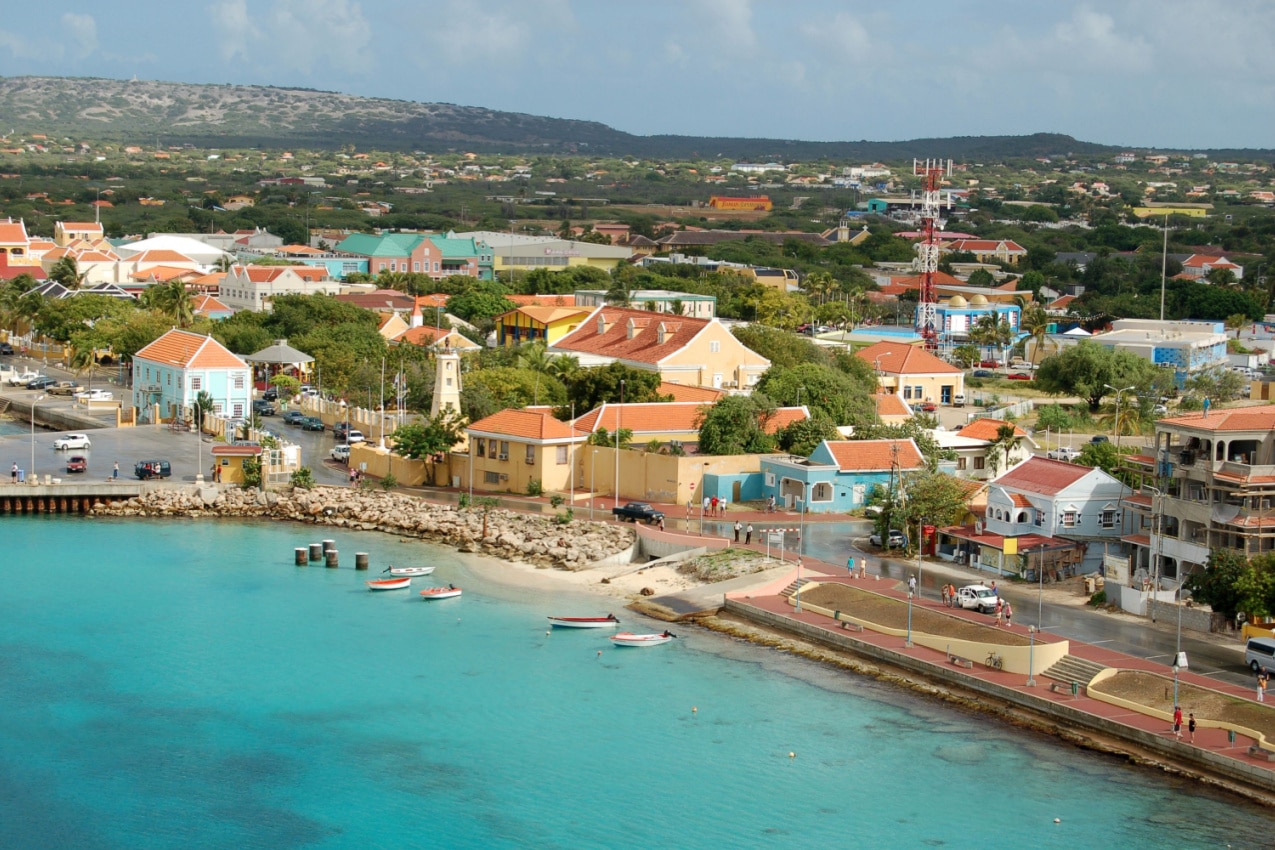
Aruba is one of the safest islands in the Caribbean and a safe tourist destination overall .
Here’s the most important safety information about Aruba in a nutshell:
- Travel Advisory: Every major travel advisory in the world gives Aruba a green light.
- Crime rate: Aruba’s crime rating is 23.45, one of the lowest in the region. The only prevalent crimes are petty theft, street crime, and break-ins.
- Danger zones for tourists: Be more cautious on isolated beaches, during big events like yearly celebrations, and in San Nicolas.
- Natural disasters: The risk of a hurricane or an earthquake hitting the island is exceptionally low.
- Beach safety: There’s practically no risk from sharks.
- Solo and family travel: Both solo travelers and families are completely safe in Aruba.
Aruba Travel Advisory
The US State Department , the Government of Canada , and the UK Government give tourists planning to visit Aruba the green light.
According to the US travel advisory, Aruba is a Level 1 tourist destination, where tourists only need to exercise normal travel precautions .
The US travel advisory categorizes destinations into four advisory levels, from Level 1 (exercise normal precautions) to Level 4 (do not travel), so Aruba is categorized among the safest . Potential travelers don’t need to exercise increased caution since violent crime are almost non-existent in Aruba.
A Comprehensive Look at Aruba Crime Rates
Aruba has a very low crime rating of only 23.45.
The homicide rate amounts to no more than 2 incidents per 100,000 people — which, from a global perspective, is a very low number.
Residential break-ins and break-ins in hotel rooms or cars are a potential threat. Petty theft is also common on the beaches, where swimmers and sunbathers are likely to leave their things unguarded on the sand.
The violent crimes in Aruba are higher in places usually not frequented by tourists, where there have been some reports of street gang presence.
San Nicolas, the second-largest city in Aruba, is one notable exception to this rule. The city is known for its nightlife, but also reportedly for the higher prevalence of crime there.
Who’s Guarding the Island? Police Presence in Aruba
The main police presence in Aruba is the Aruba Police Force — or Korps Politie Aruba (KPA) in Dutch — and its staff of 200 officers.
However, the Caribbean as a collective of islands shares one serious problem: organized crime. That’s why most of its islands have INTERPOL headquarters and active operatives on the ground, including Aruba.
The Risk of Natural Disasters in Aruba
The risk of a hurricane or an earthquake causing any significant damage to Aruba is very small.
Hurricane Information and Precautions
The Caribbean, in general, is well known as a hurricane-prone area, with hurricane Irma in 2017 causing considerable damage to some of the islands, including Barbuda and Anguilla.
However, the island of Aruba is outside the Caribbean hurricane belt. While the hurricane season in the Caribbean usually lasts from June to November, Aruba typically stays out of danger, aside from the occasional stronger tropical storm.
Earthquake Information and Prevention
According to up-to-date statistics from October 2023 regarding the geographical profiling of Aruba, the risk of earthquakes is even smaller than that of hurricanes. Additionally, there are no significant historical examples of major or catastrophic earthquakes in Aruba, or near the island.
Breathing Safely in Aruba: Carbon Monoxide Awareness and Prevention
There have been no cases of poisoning or fatalities from carbon monoxide in Aruba.
In the Caribbean, there has been one reported event of a person dying from this invisible and almost undetectable enemy in the Sandals resort in the Bahamas .
Still, it’s always a good idea to be mindful of the possibility when you’re traveling to a new destination.
Poisoning from carbon monoxide usually manifests with strong headaches, nausea, chest pain, and vomiting. Longer exposure to the gas may lead to suffocation, serious brain damage, blindness, or worse, be fatal.
Awareness of the dangers of poisoning from carbon monoxide is rising worldwide. Some hotels in the Caribbean are installing carbon monoxide detectors in their rooms after the unfortunate incident in the Sandals resort.
Aruba Beach Safety
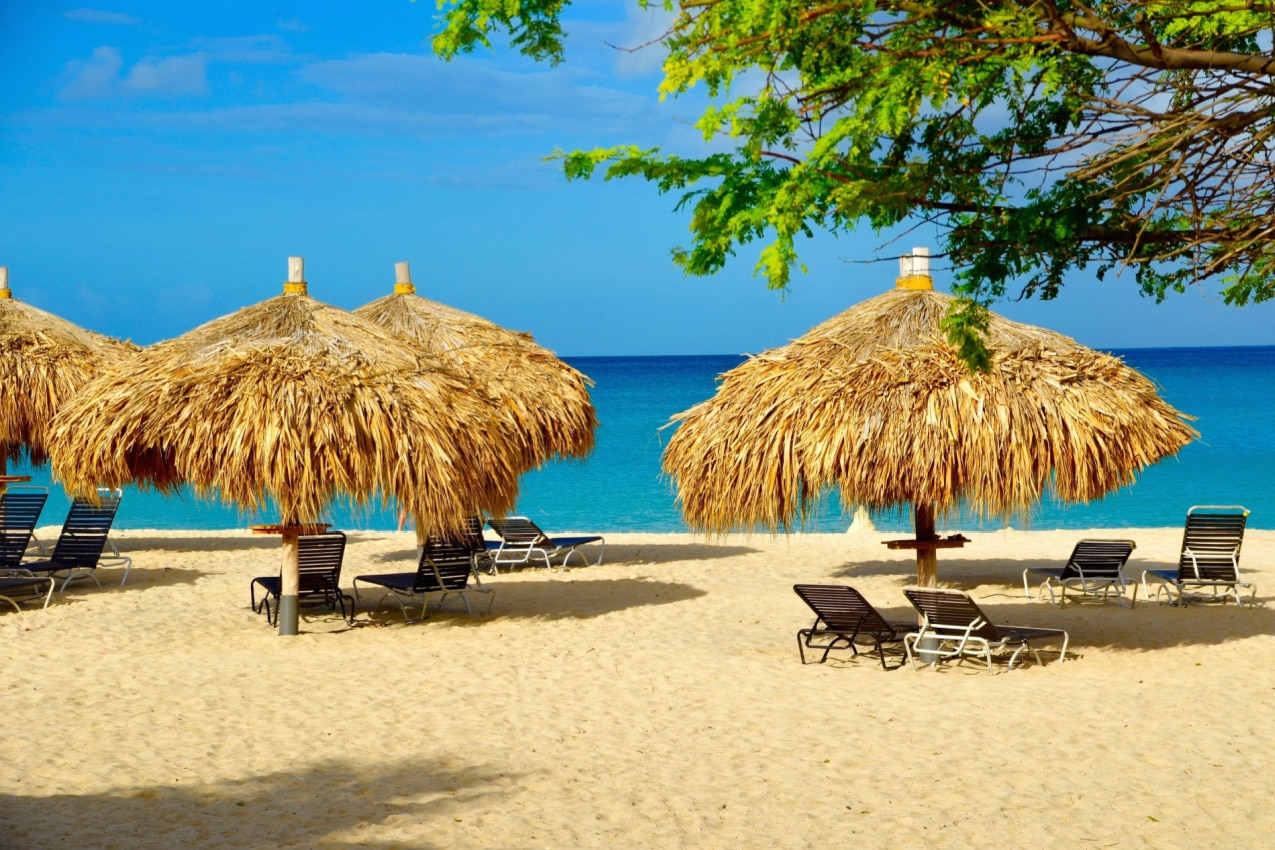
Aruba, like most of the Caribbean islands, uses the standard flag system to signal the safety level of its beaches.
Here are the usual flags and their meaning:
- Green flag: Calm waters, safe for swimming
- Yellow flag: Moderate currents, swim with caution
- Single red flag: Strong currents, swimming isn’t recommended
- Double red flags: Very dangerous, the water is closed to the public
- Red and yellow flag: Swimming area with lifeguards
- Black and white quartered flag: Surfing area, swimming isn’t allowed
- Purple flag: Dangerous marine life
One of the first things you should know about the beaches in Aruba is that they don’t have lifeguards .
Some of the beaches in Aruba have strong rip tides and currents , so less experienced swimmers are advised to stay closer to the shore.
When it comes to sea life, you are most likely to encounter lionfish or jellyfish. Their stings, although not deadly or extremely dangerous, can be very painful.
Shark attacks almost never happen near the island . There is just one report of an isolated incident in 2015 when the boat of a Venezuelan citizen was capsized by a shark.
Beach Petty Theft
Petty theft is a common occurrence on Aruba’s beaches.
Unlike the well-known Eagle Beach, Palm Beach, and Baby Beach, which are always crowded, Boca Prins, Andicuri Beach, and Grapefield Beach are secluded , with almost no infrastructure and no cafes and hotels nearby. Sticking to the world-famous beaches is always the safer choice.
It’s also good practice not to take your most valuable items with you. The UK government , for example, advises travelers to leave almost everything in their accommodations and just have a copy of their passport or ID on hand.
Aruba Weather Patterns: What to Expect
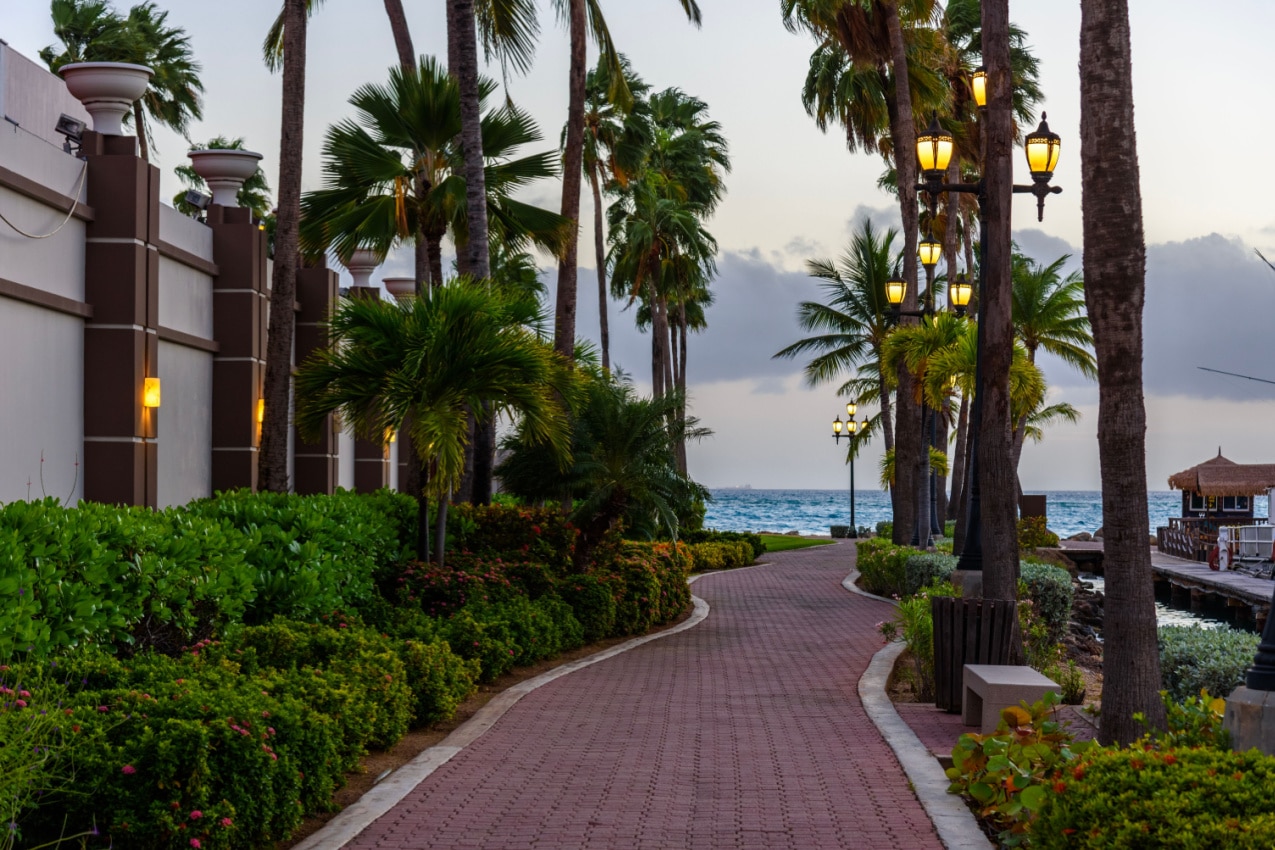
Aruba has a hot semi-arid climate, much like a savannah. This means the island is hot and dry for most of the year, unlike the other islands in the Caribbean, which have a more tropical climate with plenty of rain.
The temperature is stable throughout the year — the maximum temperature is 89°F (32°C) and the minimum temperature is 79°F (32°C) on average. Rain is scarce, amounting to no more than 450 millimeters (18 inches) per year.
Weather Overview in Aruba
Summer (june-august).
The summer months are the hottest in the year, with an average temperature between 90 and 92°F (32 and 33°C). There are no more than three or four rainy days a month — most of the days between June and August are sunny and hot. The sun is up for the highest number of hours during the summer, reaching its zenith in July, with ten hours of sunlight per day.
This period is especially popular for snorkeling, scuba diving, and swimming. June is particularly known for its strong winds — it offers the best weather conditions for windsurfers and kiteboarders.
Fall (September-November)
Late summer and fall are peak hurricane seasons in the Caribbean, but this doesn’t apply to Aruba. The temperatures range between 89°F and 92°F (31.5 to 33.2°C), but there is a rise in the number of rainy days — especially in October and November — when it goes from seven to 10 rainy days a month.
Winter (December-February)
Winter is the coldest month in Aruba, but still pretty hot compared to most other places on Earth — the temperatures during the daytime rarely fall under 81°F (30°C), while the lowest linger around 77°F (25°C) in the coldest nights in January and February.
The slightly cooler temperatures provide a perfect chance for exploring the landmarks on the island, like Ostrich Farm and the very popular Arikok National Park.
The rainy days experience a peak in December and January, amounting to around 11 days of rain a month, but they slowly dwindle in February as the number drops to four. Although the rains are frequent, they generally don’t last long. They provide a nice chance for a cocktail break between beach visits.
The amount of sunshine per day also reaches its lowest point in December (only seven hours of sun a day) but rises to eight hours a day in January and stays mostly constant or even higher during the rest of the year.
Spring (March-May)
In spring, considered the most colorful season in Aruba, the temperature hovers between 82 and 84°F (31 and 32°C) on average. There is ample wind, so there are the right weather conditions for windsurfing. The rainy days are at their lowest, with March, April, and May boasting a total of six days on average. The number of sunshine hours stays stable at eight throughout spring.
When Is the Best Time to Visit Aruba?
The best time to visit Aruba is definitely between February and May. This is when the weather is hot, but not unbearably so, the days are long, and there’s very little rain. But, in that part of the year, Aruba is crowded with tourists, and the hotels are usually the most expensive.
The period between August and December sees a decline in tourist visits, mostly because of the shorter days and higher possibility of rain.
The late summer and fall periods are also a good time to visit for other reasons — it’s when Aruba is most affordable, as the prices of hotels and other types of accommodation fall significantly.
September and November, particularly, are very popular for visitors who prefer a more peaceful vacation since the island is mostly empty in that period of the year.
Overall, the climate of Aruba makes it one of those destinations that are great to visit throughout the whole year. Although the period between August and December is considered off-season, it’s still not a bad time to visit — just a little bit more rainy and peaceful.
Exploring Aruba Alone or With a Family: Is It a Good Idea?
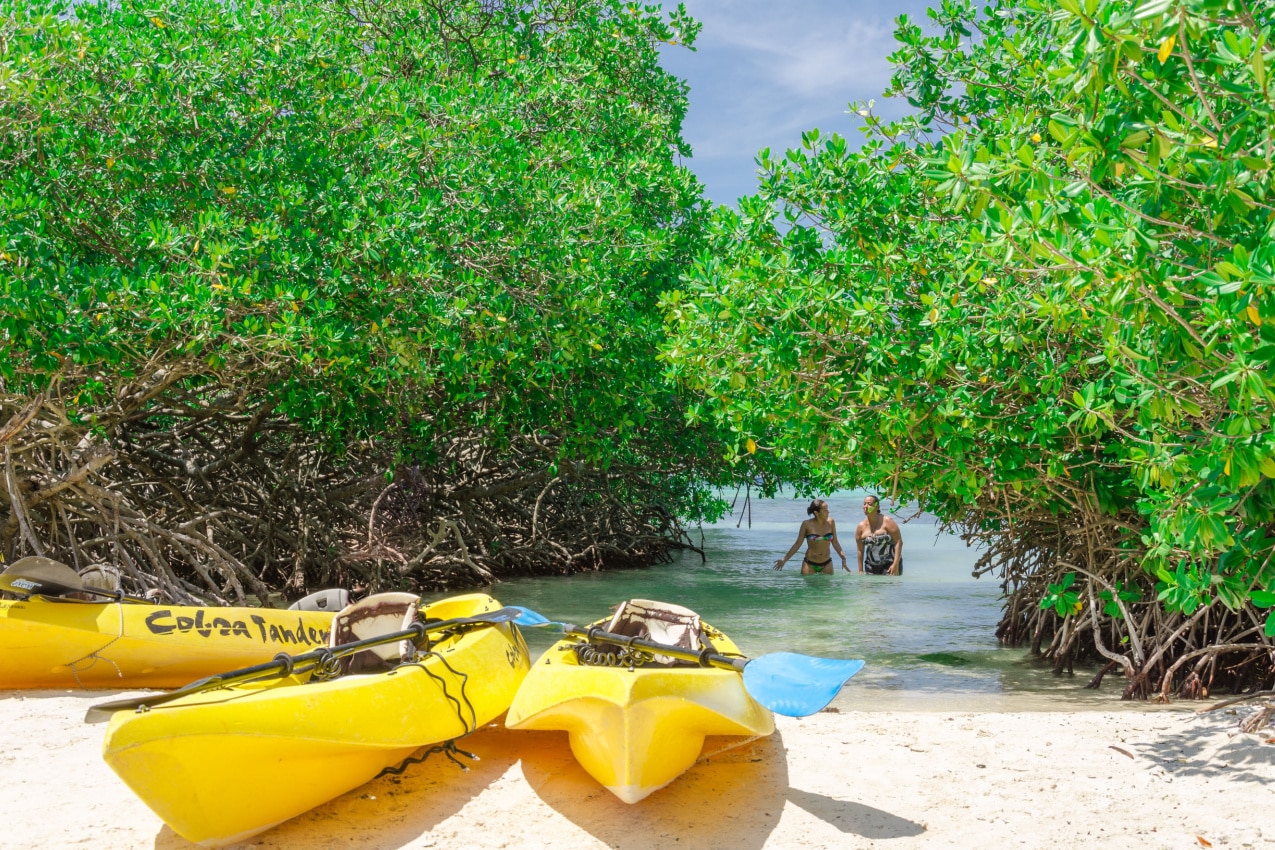
Aruba is safe both for solo travelers and for whole families looking for some quality bonding time. But, as in any other part of the world, there are some things that you have to keep in mind if you want to have a relaxed and problem-free vacation.
Essential Tips for Staying Safe
- Stay close to large groups of people and avoid wandering alone
- Refrain from getting inebriated in bars or nightclubs
- San Nicolas and its red district can be more dangerous, particularly for solo travelers who are not very careful or in full control of themselves
- Don’t flaunt your valuables, and don’t leave them unattended on the beach
- Avoid withdrawing money from an ATM at night and don’t bring a lot of cash with you while strolling around the city.
Additional Travel Tips
- Aruba has very clear rules of conduct when it comes to public decency. Walking in your swimsuit around town is frowned upon. If you’re visiting a restaurant or a shop in the city, make sure you cover up.
- Sunbathing topless or nude is illegal
- Littering is punishable by law
- Plastic bags are banned
- It’s forbidden to climb the Fofoti trees, which are very fragile
- Feeding or disturbing the wildlife on the island is illegal
- Always keep some cash in the local currency (florins), as there are some places that don’t accept USD — although, overall, most do.
Tips for Traveling with Your Family
Aruba is a good pick if you want a relaxed and comforting family-friendly vacation. The beaches are clean and safe overall, and there are a lot of kid-friendly activities you can do as a family, like swimming or exploring Aruba’s Butterfly Farm of the Donkey Sanctuary.
Simply put, there’s nothing to worry about as long as you’re careful and you use your common sense.
Don’t leave your accommodation without a first-aid kit, especially if you’re traveling with smaller kids. Keep your children (and yourself, for that matter) away from the sun, especially during the afternoon when the sun is at its peak.
If you’re traveling as a family, keep in mind that the infrastructure and the public transportation in Aruba are not great. The buses can be unreliable, so it can happen that you’re left to wait in the sun for transportation, which is not ideal if you have small children. That’s why the best idea is to rent a car if you’re planning to travel around the island.
The US State Department classifies Aruba as a Level 1 country and advises travelers to exercise only normal precautions as the level of crime there is very low. The only thing you should worry about as a tourist is petty theft and small robberies.
Unlike in many other Caribbean islands, there is no hurricane risk in Aruba. The weather is pretty stable throughout the year, with minimal rainfall — so don’t let fear of the famous Caribbean storms dissuade you from vacationing on this small island.
All in all, Aruba is safe for both solo travelers and families, provided that you take the common-sense precautions you’d take when traveling anywhere else in the world. Have a fun trip!
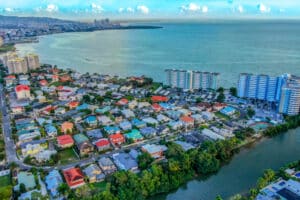
Trinidad and Tobago Safety 2024: Trinidad and Tobago Safe to Visit
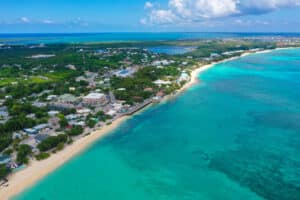

Cayman Safety 2024: Is Cayman Safe to Visit?
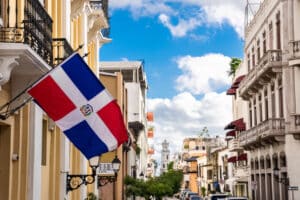
Dominican Republic Safety 2024: Is Dominican Republic Safe to Visit?
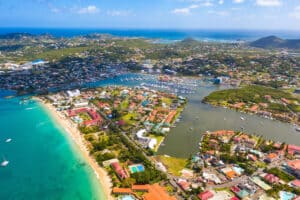
St. Lucia Safety 2024: Is St. Lucia Safe to Visit?
We love Aruba, we’ve traveled there since 2000, our children, their children all love Aruba and travel there as well.
Hi Anthony, thank you for reading. Always LOVE receiving these first-hand experiences of these wonderful destinations!
I have been to Aruba twice in the last 5 years. Beautiful island, safe, wonderful people, good food, much to explore. Will go again. Best restaurant overall : The Barefoot Restaurant. Their byline is : Elegant Dining in Flip Flops! Excellent food and service! Literally right on the beach, watching the beautiful Aruba sunset!
Hi Neal, thank you for reading and we really appreciate your first-hand experiences on Aruba!
You must be logged in to post a comment.

TRAVEL ADVISORIES
The Aruba Airport wants to ensure all passengers traveling to and from Aruba are well prepared for smooth travels. Here’s some tips and tricks for a pleasant experience for travelers entering and exiting the Aruba Airport.
Before travel to Aruba
Before you return home (all other non-us countries).
Airline Updates Always verify airline requirements and any travel updates leading up to your travel date. Download the App of your airline for easy boarding pass access, ad hoc flight, and gate changes on the day of travel.
ED card The Aruba ED Card (Embarkation/Disembarkation) is a mandatory step for every passenger entering Aruba, including babies and kids, and needs to be filled out and approved in advance.
What to bring Make sure you are packed for success and bring important travel documents and other must-haves like prescription drugs, sun protection and travel insurance. More packing tips can be found here
Global Entry To avoid long lines at domestic and international security screening points, you can enroll in Global Entry (for US travelers only). Travelers must be pre-approved. Make sure to start the application process well ahead of time, as this includes an in-person interview and rigid background checks. Find the Global Entry application form here
VIP Arrival Service Don’t want to lose a valuable minute of your Aruba vacation? Our VIP Concierge Service provider can fast-track you through the arrival process and arrange for airport pick up transportation.
Check in time Make sure to arrive at the Aruba Airport 3 hours before your scheduled departure time.
Travel efficiently Enhance the overall process of going through customs and security controls and keep travel documents as passport and boarding pass at hand, dispose of all liquids before entering the screening post, wear shoes that are easy to take on and off and make sure to place all electronics and belts separately in a bin.
VIP service There is a VIP Concierge Service operator that provides fast-track travelling VIP service at the Aruba Airport and includes skipping the majority of the authority lines and access to the Airport’s VIP lounges.
What can’t I take home? You are not allowed to bring any flora, fauna or other natural treasures unique to Aruba back home with you, including any and all seashells. Find a full list of inadmissible items here .
This section contains information to make your travel through our airport more comfortable and efficient.
Sections in the document:
Inadmissible Items
- Check-In Time
Transportation
- Security Checkpoints
Electronics & Film
Food & beverage, medical considerations.
When packing your baggage and carry-on items you should keep a few things in mind. Also have a look at this page for a list of inadmissible Items.
Make sure you put all your important personal belongings like travel documents and medications in your carry-on luggage. There are restrictions on liquids, gels and aerosoles you can carry. Most airlines limit the size and weight of carry-on items, for more information contact your airline.
When packing your baggage and carry-on items, make sure you label all of your bags and suitcases. This label should contain your name, address and phone number.
Airlines limit the weight of your baggage. Excess weight may result in penalty fees. For information on weight limitations please contact your airline.
Please leave all carry-on items unlocked while passing through screening points. Locked items can cause screening delays when they have to be opened for inspection.
There are certain items that you are not allowed to take with you when you travel by airplane. Items like weapons, sharp objects, certain tools, flammable items, explosive items, and some sporting goods are prohibited. Do not take these items with you to the airport. A complete listing of these inadmissible items can be found on this page.
Check-in & Time requirement
Aruba Airport provides full Pre-clearance services towards the United States. For all departures towards the United States the check-in time is three hours before scheduled departure.
The check-in time for other destinations varies from two to three hours. For more information about the check-in times contact your airline. Contact information can be found here .
The busiest days/times for US-bound departures is Fri-Sat-Sun from around 11:30 am and continues untill aproximately 15:00 pm. If you are travelling during above mentioned days/times,please reserve extra time for check-in and processing.
When dropping a departing passenger off at Aeropuerto Internacional Reina Beatrix, please remember that the zone in front of the terminal building is a no-parking zone and for immediate loading and unloading only. We advice to park your vehicle at the airport parking area. Do not leave your vehicle unattended at any time whilst in front of the terminal. For security reasons, unattended vehicles are towed immediately at the owners cost.
When picking up an arriving passenger at Aeropuerto Internacional Reina Beatrix, please remember that the zone in front of the terminal building is a no-parking zone. Park your vehicle at the airport parking area. For security reasons, vehicles that are left unattended in front of the Airport terminal will be towed immediately at the owners cost.
Transportation on Aruba
More information about transportation on aruba can be found on the Public Transportation page.
Checkpoints
At the checkpoints all carry-on items are scanned for inadmissible items. The following advisories help you pass the checkpoint faster.
Please minimize the metal you wear when travelling. Avoid wearing big belt buckles, clothing with metal buttons, lots of jewelry, and metal in the toes or heels of some footwear, since these can set off security checkpoint metal detectors. It is advisable to put keys, coins, watches and other metal items in your carry-on baggage until you clear security.
All shoes have to be screened. Please remove your shoes at the checkpoint and put them in a tray or on the belt of the x-ray machine. Your cooperation with this process will speed up the screening process and will get you and your fellow passengers through the screening faster.
The gates at Aeropuerto Internacional Reina Beatrix are easy to find. From the check-in areas, signs guide you through immigration and screening to your gate. The airport’s departure area is divided into two sections, US-bound departures and non-US departures.
Travelling towards the USA
Gates 5,6,7 and 8 are the standard gates for US-bound flights. At busy times gates 1,2,3 and 4 can also be used for US-bound flights. The entrance to the US-bound departures area is located to the right of the arrivals hall.
Travelling towards all other destinations
Gates 1,2,3,4, A and B are used for flights towards all non-US destinations. The entrance to the international departures area is located to the left of the arrivals hall.
General Electronics
Mobile phones, PDA’s, CD players and other electronic devices should be placed in your carry-on bag for screening.
Laptop Computers
Laptop computers should be taken out of their case and placed on the x-ray belt. It is a good idea to attach a label on the bottom of your laptop with your name, address and telephone number.
It is advised that you put film in your carry-on baggage. If you have concerns about your film, request that it be hand-inspected by a checkpoint security screener.
In check-in baggage Avoid packing foods and beverages in your check-in baggage. Certain foods and beverages have a density that can not easily be read by the screening equipment. Packing these items in your check-in baggage will result in your luggage being opened by security for inspection.
Restricted items when travelling to the USA
When travelling towards the USA, you have to comply with the rules and regulations of the U.S. Department of Agriculture.
USDA, APHIS, places limits on agricultural items brought into the United States from foreign countries because many items can harbor foreign animal or plant pests and diseases that could seriously damage America’s crops, livestock, pets, and the environment.
APHIS requires that travelers entering the United States from a foreign country declare all: Fruits Vegetables Plants and plant products Meat and meat products Animals, birds, and eggs.
Your declaration may be oral, written, or both and must cover all items carried in your baggage and hand luggage. If you are returning from abroad, you will be given a Customs Declaration form on which to declare your agricultural products. You will also be asked to indicate whether you have visited a farm or ranch outside the United States.
APHIS officers inspect passenger baggage for undeclared agricultural products. Failure to declare any items may result in delays and fines of up to $1,000. Agricultural products of U.S. origin, such as fruits, vegetables, meats, and birds taken out of the United States, cannot always be reentered into the country. These items should be declared upon returning. Consult in advance with APHIS inspectors.
Food Products (Prepared)
You may bring bakery items and certain cheeses into the United States. The APHIS web site features a Travelers Tips section and Game and Hunting Trophies section that offers extensive information about bringing food and other products into the country. Many prepared foods are admissible. However, almost anything containing meat products, such as bouillon, soup mixes, etc., is not admissible. As a general rule, condiments, vinegars, oils, packaged spices, honey, coffee and tea are admissible. Because rice can often harbor insects, it is best to avoid bringing it into the United States.
Some imported foods are also subject to requirements of the U.S. Food and Drug Administration.
Passengers traveling with medication and/or medical issues should be aware of the following guidelines.
Medication Please keep all necessary medication in your carry-on baggage. Please do not pack medication in luggage you intend to check-in with your airline. All medication, related supplies and supplements in their original packaging are allowed through security checkpoints once they have been screened. These include:
- Medical prescriptions (prescription medication or dispenser should be properly marked with a professionally printed label or pharmaceutical label identifying the medication or the manufacturer’s name. If for some reason you don’t have a professionally printed label, you will need to obtain a doctor’s note)
- Over-the-counter medications
- Herbal Supplements
- Insulin and insulin-loaded dispensing products (vials or box of individual vials, jet injectors, pens, infusers, and preloaded syringes) properly marked with a professionally printed label or pharmaceutical label identifying the medication or the manufacturer’s name;
- Unlimited number of unused syringes when accompanied by insulin
- Lancets, blood glucose meters, blood glucose meter test strips, insulin pumps, and insulin pump supplies. Insulin pumps and supplies must be accompanied by insulin with professionally printed labeling or pharmacy labeling identifying the medication or manufacturer’s name. It is recommended that used syringes be transported in your checked baggage. However, when used syringes need to be in your carry-on baggage, please ensure they are in a hard, plastic-capped container (i.e. “Sharps” disposable container) for safety and containment.
Medical Documentation
If you have medical documentation regarding your medical condition, you may present such information to the security checkpoint screener to help inform them of your situation. This documentation is not required and will not exempt you from the screening process.
Please notify the screener if you have any implanted medical devices, such as an artificial hip or knee, bone shafts, cranial plates, shrapnel, staples, pins, or metal parts that may set off the metal detector alarm.
TIP: For more information please visit this website provided by the Transportation Safety Administration.
Persons with disabilities
Wheelchairs All Airlines provide wheelchair assistance to their passengers. It is best to request this at the time of booking, but it can also be requested at the check-in before the flight.
Physically Challenged Persons The airport terminals of Aeropuerto Internacional Reina Beatrix are equipped with the required facilities to accomodate the physically challenged.
TIP: For more information on the possibilities for persons with disabilities please contact your airline
For screening purposes please leave gifts unwrapped while travelling through our airport. Wrapped gifts may have to opened for screening.
All animals, with the exception of service dogs, must be kept in their travel carriers while inside the airport terminal. While outside the terminal building all pets must be on a leash.
Flight Info
Cookies on GOV.UK
We use some essential cookies to make this website work.
We’d like to set additional cookies to understand how you use GOV.UK, remember your settings and improve government services.
We also use cookies set by other sites to help us deliver content from their services.
You have accepted additional cookies. You can change your cookie settings at any time.
You have rejected additional cookies. You can change your cookie settings at any time.
Warnings and insurance
Before you travel.
No travel can be guaranteed safe. Read all the advice in this guide. You may also find it helpful to:
- see general advice for women travellers
- read our guide on disability and travel abroad
- see general advice for LGBT+ travellers
- read about safety for solo and independent travel
- see advice on volunteering and adventure travel abroad
Travel insurance
If you choose to travel, research your destinations and get appropriate travel insurance . Insurance should cover your itinerary, planned activities and expenses in an emergency.
About FCDO travel advice
The Foreign, Commonwealth & Development Office ( FCDO ) provides advice about risks of travel to help you make informed decisions. Find out more about FCDO travel advice .
Follow and contact FCDO travel on Twitter , Facebook and Instagram . You can also sign up to get email notifications when this advice is updated.
Related content
Is this page useful.
- Yes this page is useful
- No this page is not useful
Help us improve GOV.UK
Don’t include personal or financial information like your National Insurance number or credit card details.
To help us improve GOV.UK, we’d like to know more about your visit today. Please fill in this survey (opens in a new tab) .
- Best Time to Visit
- Weather & Climate
- Queen Beatrix International Airport Guide
- Places to Visit
- Driving Tips
- Safety in Aruba
- Best Beaches
- Where to Go Snorkeling
- Things to Do in Oranjestad
- Guide to Arikok National Park
- Adventurous Things to Do
- Annual Events
- Food to Try
- Best Restaurants
- Nightlife Guide
- Search Please fill out this field.
- Newsletters
- Destinations
Is It Safe in Aruba?
TripSavvy / Taylor McIntyre
Overall, Aruba is safe for tourists and deserves its reputation as a tropical haven in the Caribbean. However, travelers should still be mindful of their well-being when visiting the island. Aruba is usually one of the safer islands to visit, as it is located just south of the hurricane belt, and therefore is unlikely to be hit by severe tropical storms. From navigating city streets to rural roads in the Aruban desert, here is your guide to safety precautions in Aruba based upon your specific travel circumstances. Whether you're traveling solo or with a family, we've got you covered.
Travel Advisories
- Due to the COVID-19 pandemic, border restrictions and travel advisories have been changing frequently and as necessary to help travelers stay safe and informed during their visit. For updates on your trip to Aruba, be sure to check the U.S. State Department site for up-to-date Travel Advisories , as well as any requirements dictated by the local government for when you arrive.
- Unlike other islands in the Caribbean Sea, hurricanes aren't a significant threat for vacationers in Aruba. The Dutch Caribbean nation is located just below the Hurricane Belt , rendering major storms a rarity on the island. (As a result, the summer and fall remain ideal times for tourists to visit, as prices are lower and visitors don't have to risk the tropical storm warnings that would accompany travel to other island destinations in the Caribbean during this time of year). The last hurricane to affect Aruba was more than a decade ago, in 2007, with Hurricane Felix, though this Level 2 hurricane only caused minor damage to the island.
Is Aruba Dangerous?
The threat of crime on the island of Aruba is generally considered to be quite low, though there have been incidents of property theft from hotel rooms and armed robberies. As such, travelers should make use of the safes in their hotel rooms and be sure not to leave valuables unattended in public places—beaches, cars, and hotel lobbies are particularly easy targets for theft. Car theft of rental cars can also occur. Younger travelers should also be aware that the legal drinking age of 18 is heavily enforced throughout the island.
Is Aruba Safe for Solo Travelers?
Aruba is generally safe for solo travelers, though visitors should take additional precautions of minding their belongings in public spaces, particularly on the beach, or exploring in town, as you won't have a second pair of eyes to guard your possessions. The island is only 26 miles long, but parts of Aruba are quite remote (and one-fifth of the entire island is preserved by Arikok National Park). If you are interested in exploring the arid areas of the tropical desert on your own, be sure to pack water to stay hydrated, and also to have a map or directions printed out or written down, in case your phone dies during your walk or hike.
Is Aruba Safe for Female Travelers?
Female travelers should stay alert and take precautions on their trip—as in, traveling in pairs or groups, being mindful of belongings—when they go out in Aruba. There are no ride-sharing services in Aruba, but cabs in the capital of Oranjestad are quite plentiful (as they usually are throughout the island). Nevertheless, travelers should arrange their drop-off and return schedule in advance, especially if they're staying in a more remote area of the island. Pre-arranging your pick-up also means agreeing on the fare in advance, as well.
Safety Tips for LGBTQ Travelers
Aruba is a safe environment for LGBTQ travelers, with a welcoming atmosphere and nightlife on offer on the island. The @7 Club Lounge and Pool Bar in Noord is a famous LGBTQ bar in Noord that is beloved by locals and tourists alike for its five-room dance parties and world-renowned musical acts. @7 is "powered by the Aruba Gay community" in its mission to showcase "The Beauty of Diversity"—and it's also just a great time.
Safety Tips for BIPOC Travelers
Aruba only consists of about 110,000 inhabitants, but there's quite an international mixture of ethnicities and cultural ancestry on the island, comprising African, Caquetio Indian, and European roots. This multicultural population makes the nation a welcoming place for all visitors. Aruba is also unique among the Caribbean islands for having such a robust Arawak history and heritage that still permeates to this day. Additionally, Aruba is home to many immigrants from South America (especially from nearby Colombia and Venezuela), as well as other islands in the West Indies, such as Haiti and the Dominican Republic.
Safety Tips for Travelers
- If you go out and drink, make sure to call a cab instead of getting behind the wheel. There are no ride-sharing apps available on the island, so rely on taxis to get back to your hotel. The blood alcohol level in Aruba is 50mg per 100ml, which means a single drink can push you over the legal limit. If you are staying in a remote part of the island, be sure to arrange your pick-up in advance.
- The more rural parts of the island are only accessible via a 4-Wheel-Drive, so renters should be sure to choose an all-terrain vehicle when renting their cars at the airport. An easy alternative is to book a day tour with a local company based in Oranjestad to take you to and from the National Park for your day outing instead.
- Ambulance & Fire department: 911
- Police: 100
- Oranjestad Hospital: +297 527 4000
- San Nicolas Medical Center: +297 524 8833
- Urgent Care Aruba: +297 586 0448; This facility takes walk-ins and is open 24-hours a day at Noord 63 in Noord, Aruba
Related Articles
More related articles.
Aruba drops pre-arrival testing requirement for vaccinated visitors

Editor's Note
Aruba, a Caribbean island just north of Venezuela, remains an attractive tropical destination for tourists thanks to an abundance of hotels redeemable by points and easy entry requirements. And those entry requirements became even easier as of Feb. 3, as vaccinated travelers no longer need to submit a pre-arrival COVID-19 test.
If you're planning a vacation to Aruba, here's everything you need to know about visiting right now.
COVID-19 test no longer required for vaccinated visitors
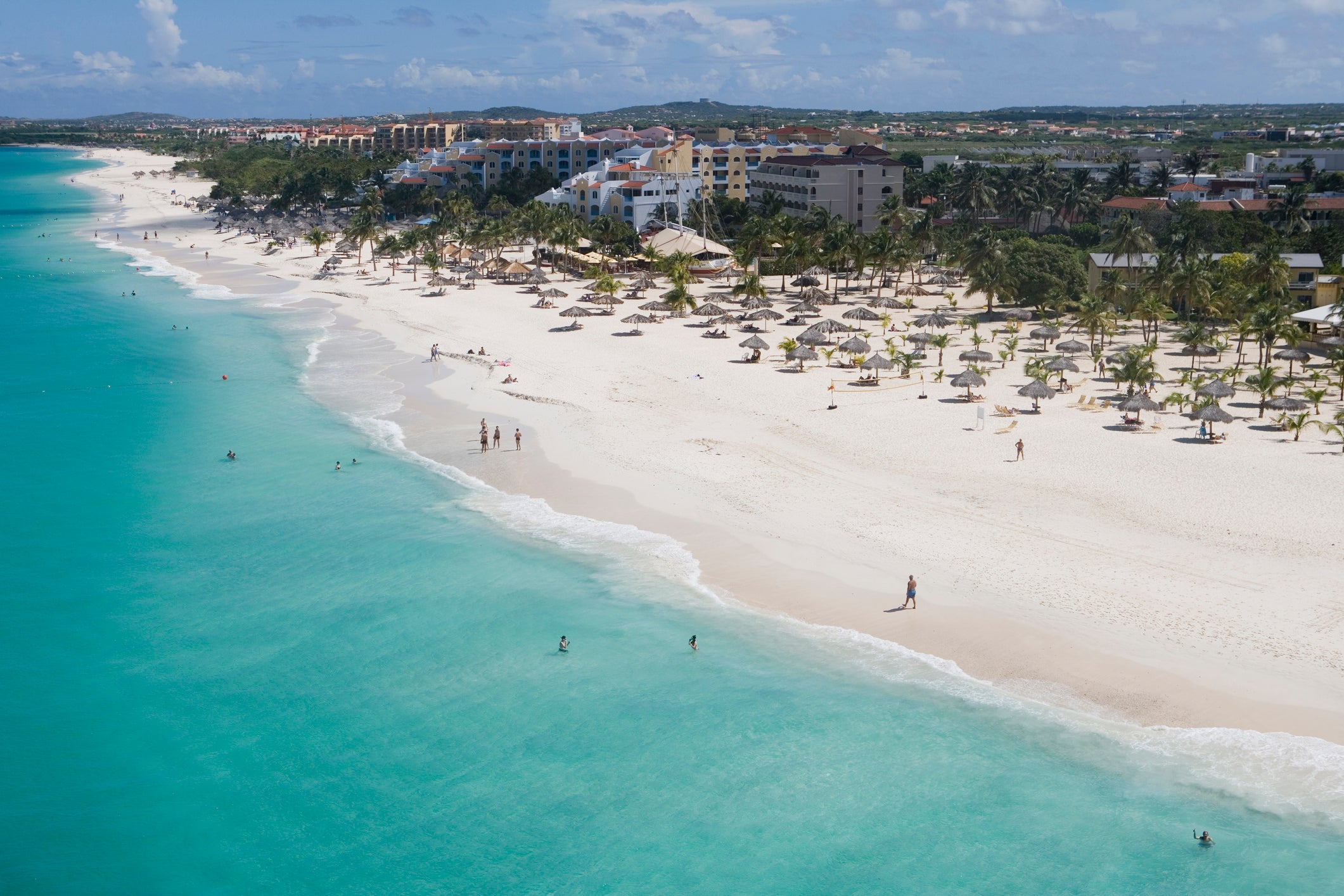
As of Feb. 8, fully vaccinated visitors over age 18 are able to enter the country without a COVID-19 test by showing digital proof of full vaccination completed at least seven days before travel, including receipt of a booster shot. This information needs to be uploaded as part of the aforementioned ED Card process within three days and up to four hours of arrival to Aruba.
Neither a physical document nor a picture of the CDC-issued vaccination card will be accepted, it must be digitally uploaded via a SMART Health Card .
Any combination of the following vaccines (and booster) are currently valid for entry:
- Comirnaty (Pfizer BioNTech)
- Spikevax (Moderna)
- Vaxzevria (AstraZeneca)
- Janssen (Johnson&Johnson)
- Nuvaxovid (Novavax)
Although a booster shot is necessary for travelers age 18 and up to be considered fully vaccinated, a booster shot is optional for travelers ages 12-17 and those 11 and younger are exempt from vaccination requirements.
Unvaccinated travelers, 12 and older, must take a COVID-19 test to enter Aruba.
As of Feb. 3, Aruba allows travelers to submit either an Antigen test (i.e. a rapid test) or Molecular test (i.e. PCR) within one or three days of arrival respectively. The previous risk levels for determining your testing window no longer apply.
Note that at-home rapid COVID-19 tests are not considered valid for entry into Aruba. JetBlue passengers wishing to test prior to travel can take an at-home PCR test via the airline's partnership with testing company Vault .
The following Antigen test types are accepted as of Jan. 18:
- Antigen test
- Rapid Antigen test
- Lateral-flow Antigen test
The below Molecular test types are also valid as of Jan. 18:
- PCR / RT-PCR / ddPCR / Rapid PCR (Polymerase Chain Reaction)
- NAA / NAAT (Nucleic Acid Amplification)AMP PRB (Amplified Probe)
- LAMP (Loop-mediated Isothermal Amplification)
- TMA (Transcription-mediated Amplification)
For more information about specific test brands, read the latest guidance from Visit Aruba .
Lastly, those travelers over the age of 12 who had previously recovered from COVID-19 within the preceding 10 days to 12 weeks of travel to Aruba are exempt from arrival testing requirements provided they do not show any symptoms upon arrival.
Related: 6 family-friendly hotels in Aruba where you can redeem points
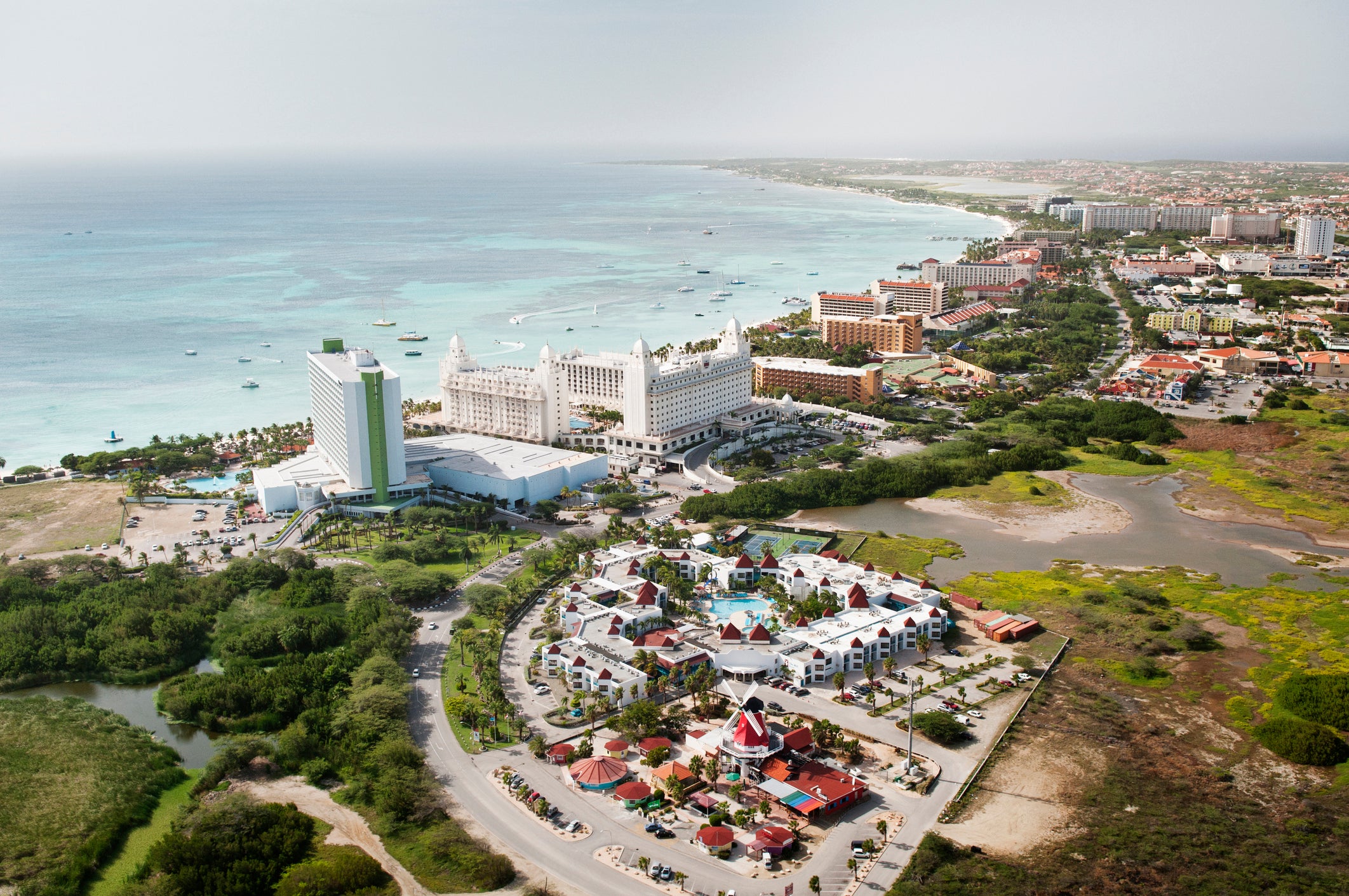
Predeparture steps: Online ED Card
All visitors to Aruba, including children, must complete an online application to obtain a digital Embarkation and Disembarkation Card with relevant traveler information. Through that digital card, travelers will submit a personal health assessment, upload results of a negative COVID-19 test (if applicable) and agree to the Aruban government's COVID-19 rules.
Additionally, travelers 15 and up must purchase Aruba Visitors Insurance, which covers COVID-19-related medical expenses including testing and isolation, for a flat-rate fee of $15 per person per stay. Those younger than 14 are exempt from the insurance requirement. Insurance must be purchased in advance of travel as part of the online application process for the aforementioned ED card.
"To maintain the safety and well-being of visitors and locals, one of the new requirements put in place for visitors to be admitted to Aruba is the mandatory Aruba Visitors Insurance, which helps to protect you against medical- and non-medical expenses incurred if you test positive for COVID-19 during your stay in Aruba," said IASA, Aruba's immigration service. "The Aruba Visitors Insurance covers all eligible foreign nationals from pre-approved regions or countries. The Aruba Visitors Insurance is mandatory and meets the Aruba government's minimum requirements."
Read more about the mandatory COVID-19 travel insurance here .
Upon arrival: Face masks and curfew
Face masks are mandatory in indoor public spaces, including retail shops, supermarkets, museums and casinos, and all businesses (except hotels) are required to close by 1:00 a.m. Both indoor and outdoor dining is limited to ten people per table.
The U.S. Centers for Disease Control and State Department have issued Level 4 travel warnings for Aruba currently.
Related: The difference between CDC and State Department travel warnings
How to get to Aruba: Limited nonstop flights
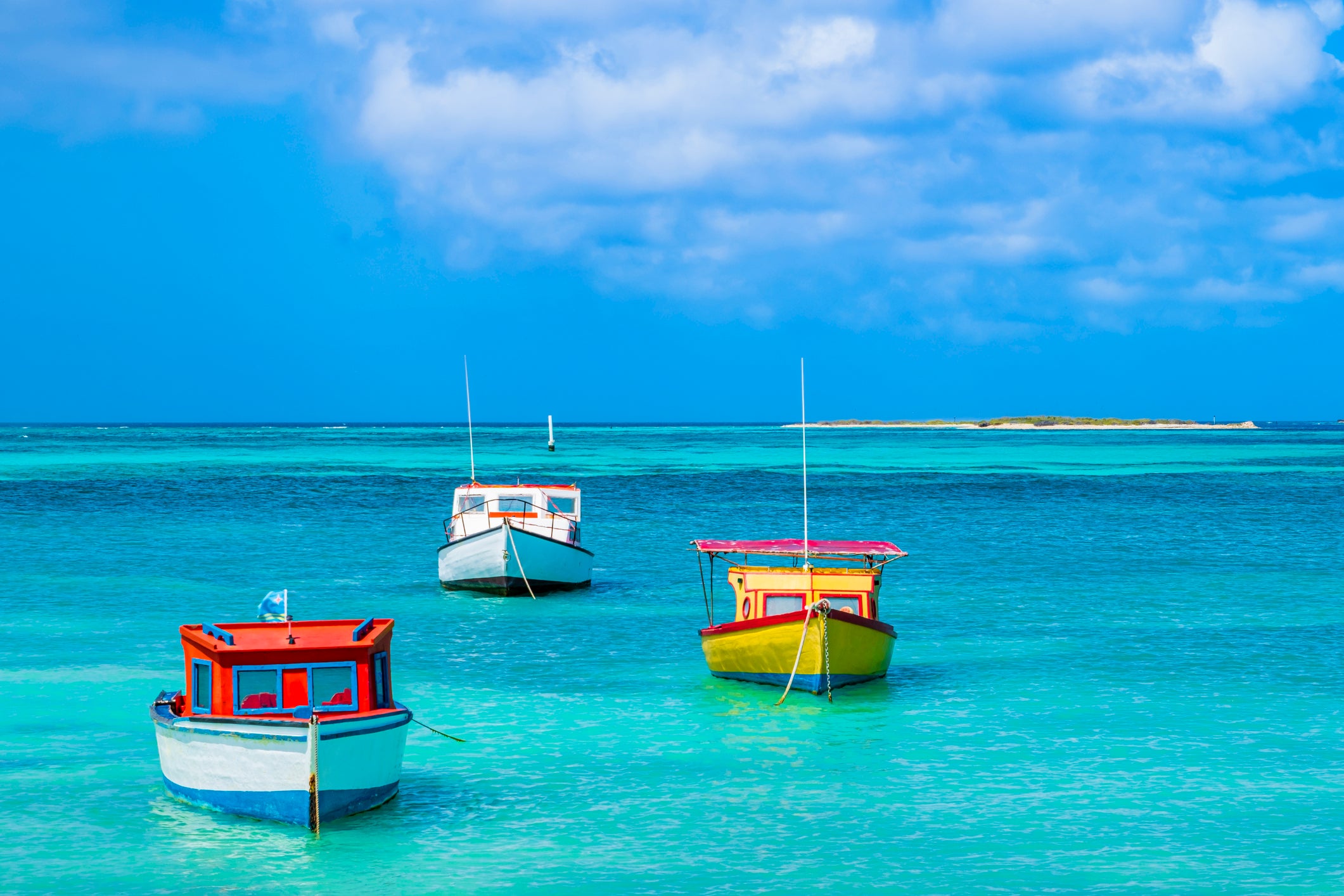
Although flight schedules have been altered due to COVID-19, there are many flights to Queen Beatrix International Airport (AUA) in Oranjestad from U.S. cities like New York, Boston, Chicago, Miami and Washington, D.C. Check out the Visit Aruba website for a complete list of airlines currently offering service to Aruba.
JetBlue, United, American and Delta currently offer nonstop round-trip flights to and from Aruba, but the availability for round-trip, nonstop flights on the same carrier remains low based on a test search conducted for this story. As a result, you may want to consider paying extra to make the entire trip nonstop and/or on the same carrier. If you're sticking to a tighter budget, try booking separate tickets with a stop or two factored in to keep the price down.
For example, the cheapest round-trip, nonstop flight I could find on a single carrier from the NYC area to AUA was out of EWR in late February on United for $563. It is in United's basic economy class, which does not include full-size carry-on luggage.
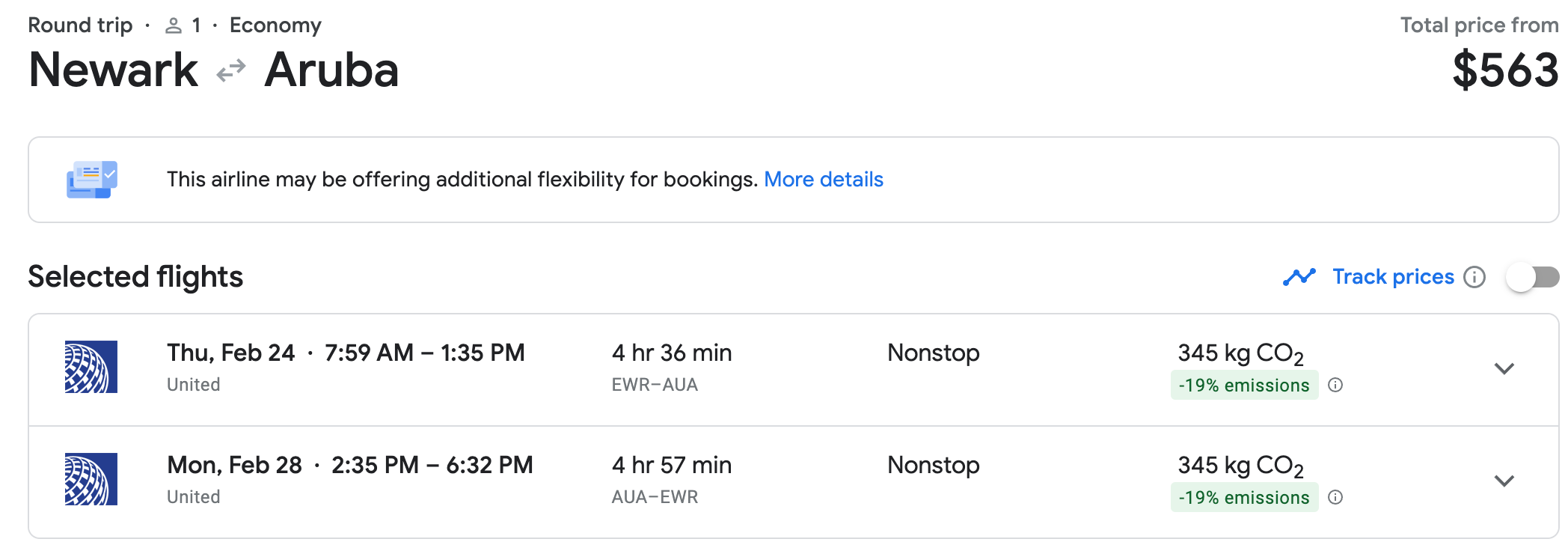
Related: How I booked a penthouse suite at Aruba's newest hotel using points
If you are dead set on flying nonstop or using points for a certain airline, try adjusting your travel dates to see if more options become available.
Where to stay: Plenty of points options
Aruba has plenty of points properties , including many family-friendly hotels where you can redeem points, as well as several points properties from Marriott , Hyatt and Hilton .
For Marriott Bonvoy members looking to splurge, we suggest The Ritz-Carlton, Aruba , where a limited view room with a balcony and a king-size bed starts at 85,000 points or roughly $1,000 per night in late February.
View this post on Instagram A post shared by The Ritz-Carlton, Aruba (@ritzcarltonaruba)
Although that's a great redemption, you could spend less at either Aruba Marriott Resort & Stellaris Casino or Renaissance Wind Creek Aruba Resort , where limited view king rooms for one night start at 60,000 points or around $700 and king rooms for one night start at 50,000 points or approximately $500, respectively. Keep in mind that you get a fifth night free when you book four award nights at Marriott hotels.
The Renaissance property is also unique in that guests at this hotel have exclusive access to a 40-acre private island called Renaissance Island, where flamingos flock on aptly named Flamingo Beach. Plus Renaissance Aruba is offering a 24-hour cancellation policy for all reservations through Dec. 21, 2022, so guests can receive a full refund.
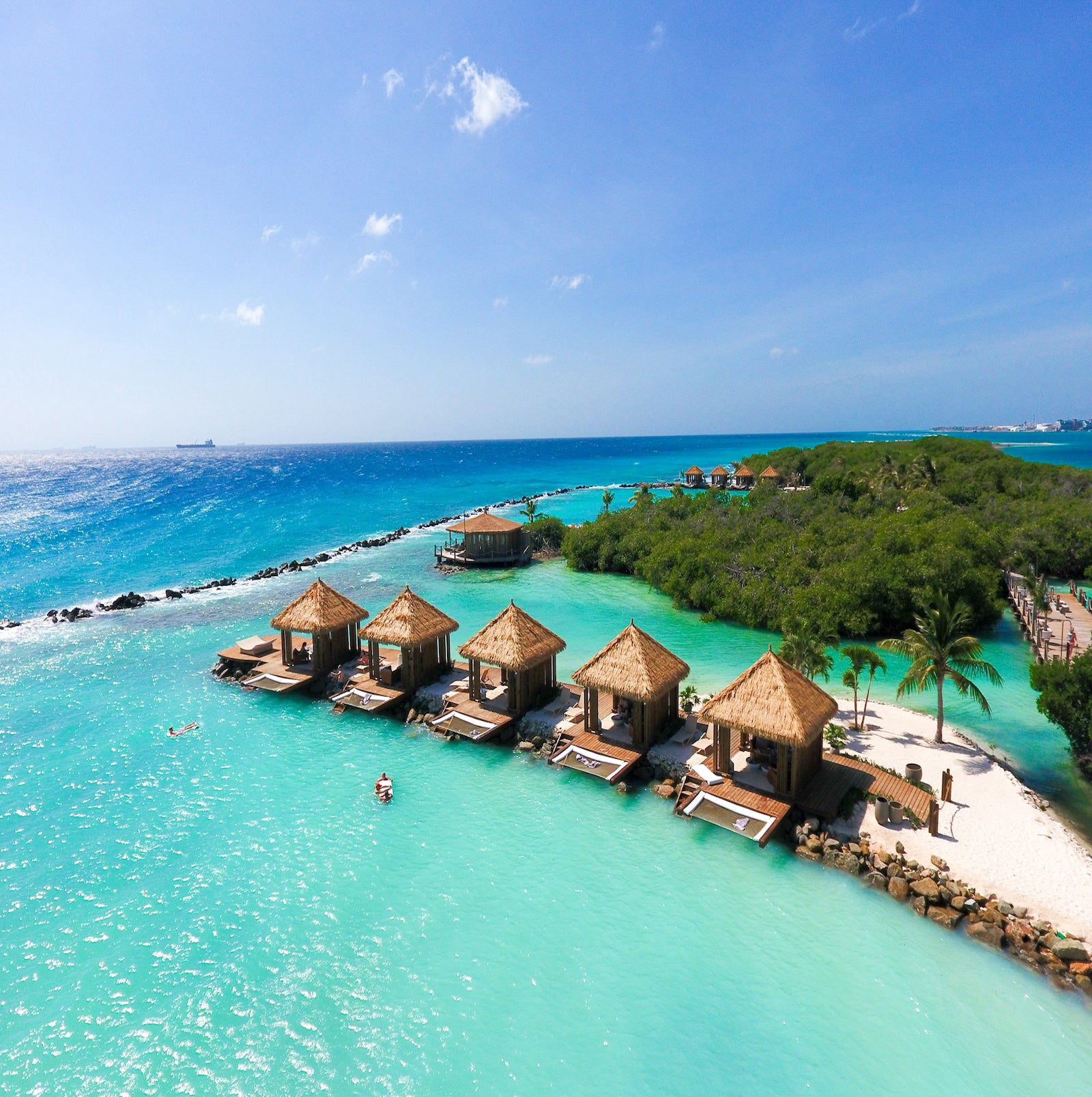
Related: 10 private-island resorts you can book with points
A king room at the Hyatt Regency Aruba Resort Spa and Casino currently starts at 14,500 World of Hyatt points + $357 per night, while a limited garden view room at the Hilton Aruba Caribbean Resort & Casino currently costs 80,000 points or roughly $700 per night.
View this post on Instagram A post shared by Hyatt Regency Aruba Resort (@hyattaruba)
Related: 9 amazing places to use points for a trip to the Caribbean
- Skip to main content
- Skip to "About this site"
Language selection
Search travel.gc.ca.
Help us to improve our website. Take our survey !
Travel advice and advisories by destination
COVID-19: travel health notice for all travellers
The Government of Canada’s official source of travel information and advice, the Travel Advice and Advisories help you to make informed decisions and travel safely while you are outside Canada. Check the page for your destination often, because safety and security conditions may change. See Travel Advice and Advisories – FAQ for more information.
Where are you going?
Take normal security precautions
Exercise a high degree of caution
Avoid non-essential travel
Avoid all travel
Travel advice from other countries
Travel advice is also provided by the governments of Australia , New Zealand , the United Kingdom and the United States .
Risk Levels
take normal security precautions.
Take similar precautions to those you would take in Canada.
Exercise a high degree of caution
There are certain safety and security concerns or the situation could change quickly. Be very cautious at all times, monitor local media and follow the instructions of local authorities.
IMPORTANT: The two levels below are official Government of Canada Travel Advisories and are issued when the safety and security of Canadians travelling or living in the country or region may be at risk.
Avoid non-essential travel
Your safety and security could be at risk. You should think about your need to travel to this country, territory or region based on family or business requirements, knowledge of or familiarity with the region, and other factors. If you are already there, think about whether you really need to be there. If you do not need to be there, you should think about leaving.
Avoid all travel
You should not travel to this country, territory or region. Your personal safety and security are at great risk. If you are already there, you should think about leaving if it is safe to do so.
- Mexico Travel News
- Seaweed Updates
- Hidden Travel Gems

Is Aruba Island Safe To Visit? Travel Advisory 2024
Travelers will be glad to hear Aruba is one of the safest islands in the Caribbean.
In fact, the United Nations and the UK Foreign Office have recently designated it as one of the safest getaways for travelers in 2024.
Its stunning beaches, delicious food and modern infrastructure, which can compete with first-world countries, are also a draw for international tourists looking to make the most of their tropical holidays.
Table of contents
March 13 – aruba issues an environmental alert after neighboring bonaire sees its shores threatened by an oil spill, crime statistics in aruba, areas to avoid, u.s. travel advisory, canada travel advisory, safety tips for aruba, latest news from aruba:.
An oil spill is about to reach the mangrove forests and national parks of Bonaire. Authorities are concerned because this island is just 189 km away from Aruba.
This potential ecological threat has prompted the government to issue an environmental alert.
As per Rino Hermans, director of Aruba’s Crisis Management Office (CMO), “We have divided Aruba’s territory into four sections so each department is monitoring,” he told Reuters . During the interview, he also assured the country is working to protect its beaches and turtle nesting areas from potential risks.
To achieve this goal, Aruba has formed a cleanup team made up of 60 local workers who are ready to tackle the issue.
With only two cases per 100,000 inhabitants, Aruba’s homicide rate is rather low. This represents a score of just 24.15 points, according to statistics retrieved from Numbeo .
Let’s take a look at other statistics that may help you make an informed decision when considering traveling to Aruba.
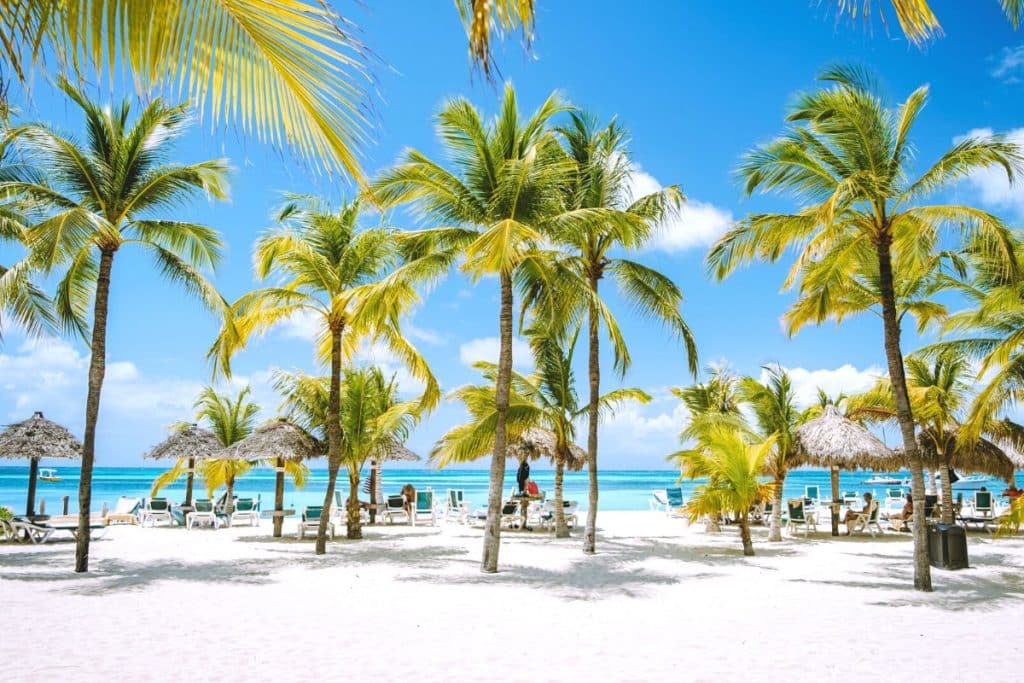
Aruba is one of those places where you don’t need to worry about the areas you should or shouldn’t visit.
However, in recent times, authorities have recommended increasing caution when visiting San Nicolas and remote beaches, especially at night . Visitors should be especially careful during major local festivities when lots of people gather together to celebrate. This increases the risk of getting pickpocketed.
Official Travel Advisories
According to the American government, Aruba ranks at level 1. This means visitors should only take normal precautions when in town.
This happens because violent crime is nearly non-existent in Aruba.
The Canadian government requests its citizens exercise “normal security precautions” when visiting the island.
Although the risk is low, they warn travelers that crime rates tend to increase from January to March when national celebrations take place in the country.
Additionally, they encourage Canadians to get vaccinated against rabies if they plan to get in close contact with the island’s wildlife.
Since no trip is completely risk-free, follow these tips to have a safer trip.
- Don’t drink too much alcohol since it makes you an easy target for thieves.
- Solo travelers should be especially careful when visiting San Nicolas and its red-light district.
- Try to never leave your belongings unattended when enjoying a day at the beach.
- Don’t use ATMs at night or in secluded neighborhoods.
- Keep in mind that topless or nude sunbathing is forbidden across the island.
- Plastic bags are banned. So, don’t use them.
- Keep in mind that it is illegal to disturb the island’s wildlife.
- Always carry some local currency, as some businesses do not take credit or debit cards.
- Travel Advisories |
- Contact Us |
- MyTravelGov |
Find U.S. Embassies & Consulates
Travel.state.gov, congressional liaison, special issuance agency, u.s. passports, international travel, intercountry adoption, international parental child abduction, records and authentications, popular links, travel advisories, mytravelgov, stay connected, legal resources, legal information, info for u.s. law enforcement, replace or certify documents.
Share this page:
Tuvalu Travel Advisory
Travel advisory august 9, 2023, tuvalu - level 1: exercise normal precautions.
Reissued with updates to health information and Travel Advisory Level.
Exercise normal precautions in Tuvalu.
Read the country information page for additional information on travel to Tuvalu.
Commercial transportation to/from Tuvalu is sporadically available.
If you decide to travel to Tuvalu:
- Enroll in the Smart Traveler Enrollment Program (STEP) to receive Alerts and make it easier to locate you in an emergency.
- Follow the Department of State on Facebook and Twitter .
- Review the Country Security Report for Tuvalu.
- Visit the CDC page for the latest Travel Health Information related to your travel.
- Prepare a contingency plan for emergency situations. Review the Traveler’s Checklist .
Travel Advisory Levels
Assistance for u.s. citizens, search for travel advisories, external link.
You are about to leave travel.state.gov for an external website that is not maintained by the U.S. Department of State.
Links to external websites are provided as a convenience and should not be construed as an endorsement by the U.S. Department of State of the views or products contained therein. If you wish to remain on travel.state.gov, click the "cancel" message.
You are about to visit:
Page not translated
The exact page you are looking for has not been translated.
Confirm Selection
This site uses cookies. Some are essential while others improve your browsing experience and allow us to advertise. For more info visit the privacy policy page.
Allow inessential cookies for:
Your preferences have been updated.
Feeling Unwell?
Html component - cvd-open.html, have respiratory symptoms.
If you're vactioning in Aruba and are experiencing one or more of the following symptoms:
- Shortness of breath
- Sore throath
- Loss of taste and smell
- Muscular pain/chills
with or without a fever (higher than 99.5 °F / 37.5 °C), and one or more of the follwing signs:
- Nasal congestion
Please consult the Department of Public Health's medical professional hotline right away
(+297) 280-0505
Based on your symptoms you'll receive medical advice related to your symptoms free of charge. Avoid going to the Emergency Room or a general practitioner, call the hotline first.
Having trouble reaching this number? Call your hotel's front-desk and ask them to transfer the call.
Testing facilities in Aruba for return flight requirements
As part of their pandemic travel protocols, some countries/states/ cities now require travelers show a negative COVID-19 test result to be granted re-entry to their country of origin. Aruba has all necessary testing facilities and procedures are in place for visitors. For a list of COVID-19 testing facilities in Aruba, click here .
IMPORTANT UPDATE FOR U.S. VISITORS: Effective January 26th, 2021, as announced by the Centers for Disease Control and Prevention (CDC), the U.S. government will require all international airline passengers to show proof of a negative, PCR or Antigen, Covid-19 test before boarding flights to the United States. For the official CDC announcement, click here .
Regulations when showing symptoms or a positive COVID-19 test while in Aruba
All visitors will be required to comply with the Government of Aruba procedures and protocols if showing symptoms and/or testing positive for COVID-19 while in Aruba. The mandatory requirements will include isolation, possible relocation and a quarantine for close contacts.
The complete details can be found in the Isolation Protocol for Visitors (version 4) as publishd by the Department of Public Health (DVG).
The Government of Aruba and the Department of Public Health continuously monitor the situation based on a range of factors and epidemiological indicators to assess risk levels. This information is subject to change at the discretion of the Government of Aruba.
We’re just getting started with the amazing effects Aruba has to offer. Dig into your trip details below to unlock a Caribbean experience that will fill you with sunshine and send you home with a happy afterglow that never fades.
Plan Your Effect
myAruba planner
Save your favorite places and experiences to a custom itinerary you can manage while you're visiting the island: Start Planning

COMMENTS
Travel Advisory. August 19, 2024. Aruba - Level 1: Exercise Normal Precautions. Reissued after periodic review without changes. Exercise normal precautions in Aruba. Read the country information page for additional information on travel to Aruba. If you decide to travel to Aruba: Enroll in the Smart Traveler Enrollment Program (STEP) to receive ...
Your passport must be valid for the duration of your stay in Aruba. Passport for official travel. Different entry rules may apply. ... IMPORTANT:The two levels below are official Government of Canada Travel Advisories and are issued when the safety and security of Canadians travelling or living in the country or region may be at risk. Avoid non ...
Monitor travel advisories and alerts and read travel tips from the US Department of State. Enroll in the Smart Traveler Enrollment Program (STEP). ... Use the Healthy Travel Packing List for Aruba for a list of health-related items to consider packing for your trip. Talk to your doctor about which items are most important for you.
Aruba is one of the safest islands in the Caribbean and a safe tourist destination overall.. Here's the most important safety information about Aruba in a nutshell: Travel Advisory: Every major travel advisory in the world gives Aruba a green light. Crime rate: Aruba's crime rating is 23.45, one of the lowest in the region. The only prevalent crimes are petty theft, street crime, and break ...
Reissued after periodic review without changes. Exercise normal precautions in Aruba. Read the country information page for additional information on travel to Aruba.. If you decide to travel to Aruba: Enroll in the Smart Traveler Enrollment Program (STEP) to receive Alerts and make it easier to locate you in an emergency.; Follow the Department of State on Facebook and X/Twitter.
The following advisories help you pass the checkpoint faster. Attire. Please minimize the metal you wear when travelling. Avoid wearing big belt buckles, clothing with metal buttons, lots of jewelry, and metal in the toes or heels of some footwear, since these can set off security checkpoint metal detectors.
As part of the ED card process, visitors can either upload a certified negative COVID-19 test prior to travel, or pre-pay for a PCR based Molecular COVID-19 test at the Aruba airport. For the most updated details on the online ED card requirements and government-mandated procedures for visitors showing symptoms or testing positive for COVID-19 ...
The U.S. State Department has issued a Level 4 travel advisory for Aruba due to COVID-19 related conditions, encouraging Americans to avoid travel to the island. Meanwhile, the Centers for Disease Control and Prevention (CDC) has issued a Level 4 Travel Health Notice for Aruba due to COVID-19 and encourages travelers to take enhanced health and safety measures if must travel to the destination ...
Aruba is widely regarded as one of the safest islands in the entire Caribbean. Unfortunately, the whole world has had to deal with the unprecedented impact of the novel Coronavirus (Covid-19), and Aruba is no exception. It is for this reason Aruba has implemented new measures to protect the health and safety of our local community and visitors ...
FCDO travel advice for Aruba. Includes safety and security, insurance, entry requirements and legal differences. ... Warnings and insurance Still current at: 6 September 2024
Mar 19, 2022. Relaxed entry requirements. Travelers are no longer required to present a COVID-19 negative test result or proof of vaccination. Feb 17, 2022. Local measures lifted. Read the details on the "During Your Stay" page. No changes to the entry requirements. Feb 03, 2022.
Travel Advisories Due to the COVID-19 pandemic, border restrictions and travel advisories have been changing frequently and as necessary to help travelers stay safe and informed during their visit. For updates on your trip to Aruba, be sure to check the U.S. State Department site for up-to-date Travel Advisories , as well as any requirements ...
It is highly recommended for each traveler to have international travel insurance with COVID-19 coverage. Since Sunday June 12th, 2022, CDC no longer requires passengers traveling to the United States to show a negative COVID-19 test. Since March 19th, 2022, travelers to Aruba are no longer required to present a COVID-19 negative test result or ...
The U.S. State Department has been busy this August, recently reissuing updated travel advisories for a handful of popular destinations. Officials issued six updates on Monday, including Level 1 advisories for the ABC Islands of Aruba, Bonaire and Curacao. Visitors to the islands are currently asked to exercise normal precautions.
High risk and very high risk countries & COVID-19. Effective Feb 3rd, 2022, Aruba is open to all countries. The previous risk levels are no longer in effect. For further updates please refer to the Mandatory Entry Requirements & Aruba Travel Restrictions due to COVID-19.
Aruba Travel Advisory: Level 1: Exercise Normal Precautions: July 17, 2023: Barbados Travel Advisory: Level 1: Exercise Normal Precautions: July 17, 2023: ... Saba Travel Advisory: Level 1: Exercise Normal Precautions: October 16, 2023: Take 90 Seconds for Safer Travel. Travel Advisory Levels.
US State Dept Travel Advisory. The US State Department currently recommends US citizens exercise normal precautions in Aruba. https: ... US does not have an embassy in Aruba; the Consul General to Curacao is accredited to Aruba; US citizens may call US Dept of State (202)-501-4444 for emergencies; alternate contact is the US General Council to ...
All visitors to Aruba, including children, must complete an online application to obtain a digital Embarkation and Disembarkation Card with relevant traveler information. Through that digital card, travelers will submit a personal health assessment, upload results of a negative COVID-19 test (if applicable) and agree to the Aruban government's ...
Travel advice and advisories by destination. The Government of Canada's official source of travel information and advice, the Travel Advice and Advisories help you to make informed decisions and travel safely while you are outside Canada. Check the page for your destination often, because safety and security conditions may change.
Travelers will be glad to hear Aruba is one of the safest islands in the Caribbean. In fact, the United Nations and the UK Foreign Office have recently designated it as one of the safest getaways for travelers in 2024. Its stunning beaches, delicious food and modern infrastructure, which can compete with first-world countries, are also a draw for international tourists looking to make the most ...
Read through all 3 steps to find out: How to answer travel and health questions. Travelers are no longer be required to present a COVID-19 negative test result or proof of vaccination. Continue on to Step 1 by clicking the button: Step 1: Basic traveler information. The Government of Aruba together with the Department of Public Health ...
Reissued with updates to health information and Travel Advisory Level. Exercise normal precautions in Tuvalu. Read the country information page for additional information on travel to Tuvalu.. Commercial transportation to/from Tuvalu is sporadically available.
Relaxed entry requirements. Effective March, 2022, Travellers are no longer required to present a COVID-19 negative test result or proof of vaccination. The Government of Aruba together with the Department of Public Health continuously monitors the situation based on a range of factors and epidemiological indicators to assess risk levels. This ...
If you're vactioning in Aruba and are experiencing one or more of the following symptoms: Cough. Shortness of breath. Sore throath. Loss of taste and smell. Muscular pain/chills. with or without a fever (higher than 99.5 °F / 37.5 °C), and one or more of the follwing signs: Weakness. Nasal congestion.